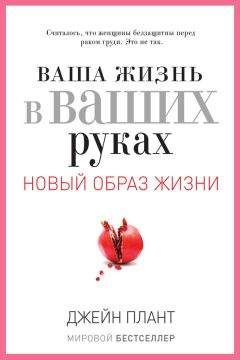Джейн Плант - Антирак груди
486
Yu, H. and others, 1999. Plasma levels of IGF-I and lung cancer risk, Journal of the National Cancer Institute, 91, 151–156.
487
Ma, J. and others, 2001. Milk intake, circulating levels of IGF-1 and risk of colorectal cancer in men. Journal of the National Cancer Institute, 93 (17), 1330–1336.
488
LeRoith, D. and others, 1995. The role of the IGF-I receptor in cancer. Annals of the New York Academy of Sciences, 766, 402–408; Butler, J., 2006. White lies. Vegetarian and Vegan Foundation.
489
Campbell, T. Colin, Campbell, Thomas M. II, Robbins, John and Lyman Howard, 2006. The China Study: The Most Comprehensive Study of Nutrition Ever Conducted and the Startling Implications for Diet, Weight Loss and Long-term Health. Benbella Books.
490
Bradford Hill, A., 1965. The environment and disease; association or causation? Proceedings of the Royal Society of Medicine, 58, 295–300.
491
Holly, J.M.P., Gunnell, D.J. and Davey Smith, G., 1999. Growth hormone, IGF-I and cancer. Less intervention. Less intervention to avoid cancer? More intervention to prevent cancer. J. Endocrinol, 162, 321–330.
492
Bobbins, John, 1987. A Diet for a New America, Stillpoint Publishing.
493
www.dhn.csiro-au/crctissue.html
494
Xian, C., 1995. Degradation of IGF-I in the Adult Rat Gastrointestinal Tract is limited by a Specific Antiserum of the Dietary Protein Casein. Journal of Endocrinology, 146, 2, 1 August, 215; Thornburg, W. and others, 1984. Gastrointestinal absorption of epidermal growth factor in suckling rats. American Journal of Physiology, 246, G80-G85.
495
The European Commission. Health and Consumer Protection. Scientific Committee on Veterinary Measures relating to Public Health – Outcome of discussions. http://europa.eu.int/comm/dg24/health/sc/scv/outl9_en.html
496
Allen, N.K, and others, 2000, Hormones and Diet; Low Insulin-like Growth Factor-1 but Normal Bioavailable Androgens in Vegan Men. Brit. J. Canc., 83 (1), 95–97.
497
Steinman, G., 2006. Can the chance of having twins be modified by diet? The Lancet, 367 (9521), 1461–1462.
498
Norat and others, 2007. Diet, serum IGF-1 and IGF-BP3 in European women. European Journal of Clinical Nutrition, 61, 91–98.
499
The European Commission. Health and Consumer Protection. Scientific Committee on Veterinary Measures relating to Public Health – Outcome of discussions. http://europa.eu.int/comm/dg24/health/sc/scv/out19_en.html
500
Heaney, R.P. and others, 1999. Dietary changes favourably affect bone remodelling in older adults, Journal of the American Dietetic Association, 99 (10), 1228–1233.
501
Gunnell, D.L. and 10 others, 2003. Are diet – prostate-cancer associations mediated by the IGF axis? A cross-sectional analysis of diet, IGF-I and IGFBP-3 in healthy middle-aged men. British Journal of Cancer, 88, 1682–1686.
502
World Cancer Research Fund, 1997. Food, nutrition and the prevention of cancer: a global perspective. Washington, DC: American Institute of Cancer Research.
503
Allen, N.E., Appleby, P.N., Davey, G. K. and Key, T.J., 2000. Hormones and diet: low insulin-like growth factor-I but normal bioavailable androgens in vegan men. Br. J. Cancer. 83, 95–97.
504
Yaker, S. and others, 2005. The role of the growth hormone/ IGF axis in tumour growth and progression: lessons from animal models. Cytokine and Growth Factor Reviews, 16 (4–5), 407–420; Butler, J., 2006. White lies. Vegetarian and Vegan Foundation.
505
Mannisto, S. and others, 1999. Diet and the risk of breast cancer in a case control study: does the threat of disease have an influence on recall bias? Journal of Clinical Epidemiology, 52 (5), 429–439; Outwater, J.L. and others, 1997. Dairy products and breast cancer: the IGF-1, estrogen and bGH hypothesis. Medical Hypotheses, 48 (6), 453–461; Gaard, M. and others, 1995. Dietary fat and the risk of breast cancer: a prospective study of 25 892 Norwegian women. Int J. Cancer, 63 (1), 13–17; Decarli, A. and others, 1986, Environmental factors and cancer mortality in Italy: correlational exercise. Oncology, 43 (2), 116–126; Rose, D.P. and others, 1986. International comparisons of mortality rates for cancer of the breast, ovary, prostate, and colon, and per capita food consumption. Cancer, 58 (11), 2363–2371; Shimada, A. and others, Ecological approach to the eating habits and the cancer mortality of Brazilian people. (in het Japans) Can No Rinsho, 32 (6), 631–640; La Vecchia, C. and others, 1986, Age at first birth, dietary practises and breast cancer mortality in various Italian regions. Oncology, 43 (1), 1–6; Talamini, R. and others, 1984. Social factors, diet and breast cancer in a northern Italian population. Br. J. Cancer. 49 (6), 723–729.
506
Rose, D. P. and others, 1986. International comparisons of mortality rates for cancer of the breast, ovary, prostate, and colon, and per capita food consumption. Cancer, 58 (11), 2363–2371.
507
Schuurman, A.G. and others, 1999, Animal products, calcium and protein and prostate cancer risk in The Netherlands Cohort Study, Br. J. Cancer, 80 (7), 1107–1113; Giovannucci, E., 1999. Nutritional factors in human cancers. Advances in Experimental Medicine and Biology, 472, 29–42; Giovanucci, E., 1998. Dietary influences of 1,25(OH)2 vitamin D in relation to prostate cancer: a hypothesis. Cancer Causes and Control, 9 (6), 567–582; Willet, W.C., 1997. Nutrition and Cancer. Salud Publica de Mexico, 39 (4), 298–309; De Stefani, E. and others, 1995, Tobacco, alcohol, diet and risk of prostate cancer. Tumori, 81 (5), 315–320; Le Marchand, L. and others, 1994. Animal fat consumption and prostate cancer: a prospective study in Hawaii. Epidemiology, 5 (3), 276–282; Talamini, R. and others, 1992. Diet and prostate cancer: a case control study in northern Italy. Nutrition and Cancer, 18 (3), 277–286; La Vecchia, C. and others, 1991. Dairy products and the risk of prostatic cancer. Oncology, 48 (5), 406–410; Mettlin, C. and others, 1989. Beta-carotene and animal fats and their relationship to prostate cancer risk. A case control study. Cancer, 64 (3), 605–612; Snowdon, D.A., 1988. Animal product consumption and mortality because of all causes combined, coronary heart disease, stroke, diabetes, and cancer in Seventh-day Adventists. Am. J. Clin. Nutr., 48 (3 Suppl), 739–748; Talamini, R. and others, 1986. Nutrition, social factors, and prostate cancer in a northern Italian population. Br. J. Cancer, 53 (6), 817–821; Rose, D.P. and others, 1986. International comparisons of mortality rates for cancer of the breast, ovary, prostate, and colon, and per capita food consumption. Cancer, 58 (11), 2263–2271.
508
Newby, J.A. and Howard, 2006. Environmental influences in cancer aetiology, 2006, 1-59.
509
Butler, J., 2006. White lies. Vegetarian and Vegan Foundation.
510
БФР (BGH, Bovine Growth Hormone) – бычий фактор (гормон) роста. – Примеч. ред.
511
Butler, J., 2006. White lies. Vegetarian and Vegan Foundation.
512
Lawrence R., 1994. Breastfeeding – A Guide to the Medical Profession, Fourth edition. Mossby.
513
Holly, J.M.P., Gunnell, D.J. and Davey Smith, G., 1999. Growth hormone, IGF-I and cancer. Less intervention to avoid cancer? More intervention to prevent cancer? J. Endocrinol, 162, 321–330.
514
Giudice, L.A., 1992. Insulin-like growth factors and ovarian follicular development. Endocrine Reviews, 13, 641–669.
515
Westlev, B.R. and May, F.E.B., 1994. Role of insulin-like growth factors in steroid modulated proliferation. Journal of Steroid Bioehemistry and Molecular Biology, 51, 1–9; Marcelli, M., Haidacher, S.J., Plymate, S.R. and Birnbaum, R.S., 1995. Altered growth and insulin-like growth factor-binding protein-3 production in PC-3 prostate carcinoma cells stably transfected with a constitutively active androgen receptor complementary deoxyribonucleic acid. Endocrinology, 136, 1040–1048.
516
Holly, J.M.P., Gunnell, D.J. and Davey Smith, G., 1999. Growth hormone, IGF-I and cancer. Less intervention to avoid cancer? More intervention to prevent cancer? J. Endocrinol, 162, 321–330.
517
Bernstein, I. and Ross, R.K., 1993. Endogenous hormones and breast cancer risk. Epidemiol Res, 15, 48–65; Pike, M.C. and others, 1993. Estrogens, progestogens, normal breast proliferation and breast cancer risk. Epidemiol Reviews, 15, 17–35.




